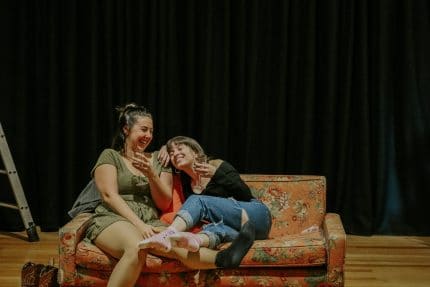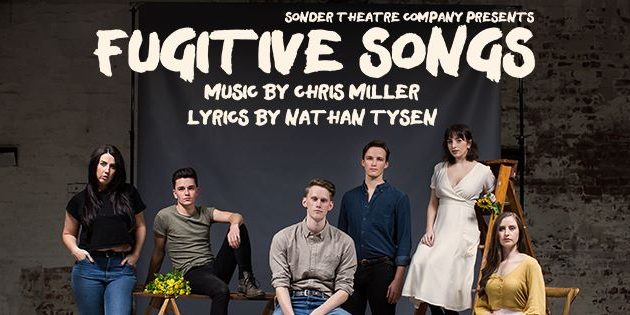SONDER gives us a place to call home with Fugitive Songs
Fugitive (noun) – a person who has escaped from captivity or is in hiding.
The word is often positioned in an extremely literal sense, but there are elements of every day life in which we all may feel like a fugitive in one way or another. Especially in our current climate, it is now more than ever that everyone has experienced this feeling in one way or another.
Fugitive Songs, with music by Chris Miller and lyrics by Nathan Tysen, was initially conceived as a “half musical/half hootenanny,” focussing on the lives of people on the run. The beautiful 19-song cycle is extremely unknown and underperformed, and showcases a multi-ethnic and tight-knit ensemble showing audiences what it is like to be a ‘fugitive,’ in every definition of the word. With the original cast boasting names like Karen Olivio, Joshua Henry and Barrett Wilbert Weed, it is truly a wonder why the piece is not staged more often.

SONDER, an independent Melbourne-based theatre company are dedicated to producing stories that explore the human condition, while creating new opportunities for artists. The company’s namesake means “the sudden realisation that each random passerby is living a life as vivid and complex as your own” – an ethos they truly showcase.
I had the pleasure of speaking to musical director Caleb Garfinkel, producer (and cast member) Lachlan Hamill, and additional cast members Jessica Papst and Saxon Gray about their journey through the production.
Fugitive Songs is more of a song cycle than traditional musical – do you think this is a more successful method of presentation?
Caleb: I’ve come to view all performances through the lens of theatre, integrally connected to narrative and story at all elements. The strength of the narrative, and the effectiveness of the storyteller, makes a successful performance to me. It’s one of the reasons I moved away from traditional band performances and into theatre, as generally bands playing songs didn’t tell a story that inspired me to listen. Though this is more of a ‘song cycle’, it’s still driven by narrative and personal journey, but allows the story to be primarily told just through song. Theatre of all forms is only successful (or not) on the strength and intent of the narrative of the writers, creatives and performers.
What drew you to choose Fugitive Songs for performance?
Lachlan: I knew that if I didn’t do it, no one would. I think people can easily relate to stories we tell in Fugitive Songs. It’s real situations, that I think we’ve, or at least someone we know have been through. It’s all about what it is to be human, whatever that may entail. The score is also a dream to listen to, it’s a beautiful blend of folk, pop and a bit of musical theatre.

Are you doing anything interesting with this production?
Caleb: I find most shows I MD are given to us as complete musical packages, but rarely are 100% right for our production straight out of the box. Our primary reference to this show was the soundtrack, which differs quite a lot from the orchestration we received. I’ve reconsidered the vocals and instrumentation of our production to best suit the talents and abilities of our cast and band, plus repurposed the instrumentation to better suit our space at Chapel Off Chapel. My background and obsession is acoustic music, so the core of all the songs is an acoustic, bluegrass base, and I consider vocals as another orchestration element. I’ve endeavoured to create a marriage between our 5 musicians and 6 singers, effectively creating an 11 piece ensemble including rhythmic instruments, strings, and voice, rather than a straightforward singer-with-backing-band arrangement. In addition, we have the band on stage nestled amongst the actors, which is a thrill I’ll never tire of, and I praise the team who obliged my stubbornness in this regard. We’re all playing our fingers off and having a ball doing it, and I think it will add a wonderful additional layer of interest for audiences.

Why should people come and see Fugitive Songs?
Jessica: I think that everyone has felt stuck, trapped, free, confused, lost, cornered, helpless, hopeless, in love with the right person at the wrong time – or the wrong person – or realised they’re no longer in love at all, at some point in their life. The source material for Fugitive Songs is those crux moments of human existence where we question, reevaluate, wonder, worry, reflect and sometimes even courageously make a change – whether it be for better or for worse. I keep finding moments where it’s like, “Oh, I’ve so been there,” or we know someone who has. And I think that’s the job of good theatre – to present ourselves TO ourselves and by doing so allow us to question and consider our lives, our choices, our values, our mistakes trough engaging with these stories on stage.
Saxon: I feel that audiences will find it easy to connect to the overarching idea of escaping. Each character is a fugitive in their own right, and I reckon anyone sitting in the audience is going to be reminded of a time when they were driven to the edge by their family, or a relationship, or uni, or their dead-end job or a million other reasons to run.
Fugitive Songs runs at Chapel off Chapel until September 2nd. Tickets are available at the Chapel off Chapel website.




